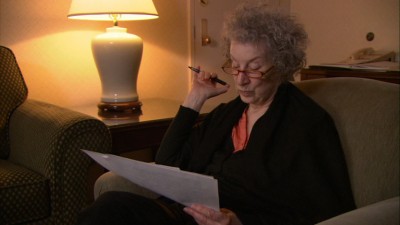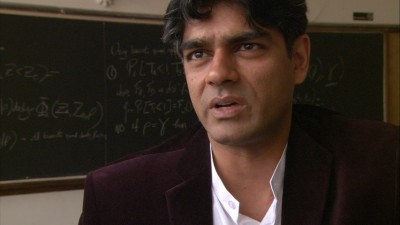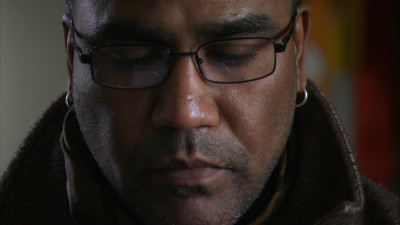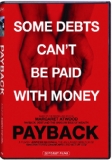| Reviews & Columns |
|
Reviews DVD TV on DVD Blu-ray 4K UHD International DVDs In Theaters Reviews by Studio Video Games Features Collector Series DVDs Easter Egg Database Interviews DVD Talk Radio Feature Articles Columns Anime Talk DVD Savant Horror DVDs The M.O.D. Squad Art House HD Talk Silent DVD
|
DVD Talk Forum |
|
|
| Resources |
|
DVD Price Search Customer Service #'s RCE Info Links |
|
Columns
|
|
|
Payback

An expansively thought-provoking documentary that's also a fairly unique work of intellectual ferment, Payback joins together two impressive creative minds, those of documentarian Jennifer Baichwal (Manufactured Landscapes) and the great Canadian novelist Margaret Atwood (The Blind Assassin). The latter turned her pen to nonfiction, as she is also well-qualified to do, for the series of lectures that resulted in her 2008 book, Payback: Debt and the Shadow Side of Wealth, upon which Baichwal has based her film. "Based" in this case is probably much too simple a word, however; Baichwal does nothing so straightforward or potentially arid as focusing on Atwood as her principal subject or cherry-picking examples from the writer's historical treatise on the concept of debt and its longstanding omnipresence in human life, then dutifully bringing her camera to them. Instead, Buchwald has humbly but boldly (and evidently with the often finicky Atwood's full blessing, as the author, at home and onstage delivering the lectures, is not primary but is prominent among the subjects Baichwal has chosen) used the book as an inspiration and jumping-off point, remaining faithful to it while also taking it further. The filmmaker has familiarized herself with her source material (likely more than once, given the understanding of the book's ideas she seems to have had at her fingertips in making the film) and then retained Atwood's already wide-ranging culmination of extensive research and deep thought as a sort of ongoing reference point for the further examples she's sought out; the result is a film that's at once bracing, beautiful, and consciousness-expanding.

The timing of Payback's publication coincided with the predatory-lending/debt-manipulation scandals that caused the financial meltdowns of '08, but one surprising characteristic of the book (and the film follows suit in this respect) was that it put money matters in the background to focus on a much longer and deeper history of debt that has left its deep traces in both our world and the words we use to describe it -- our everyday turns of phrase in matters from social organization ("to pay one's debt to society") to theology and/or pawnbroking (to "redeem" pawned items, up to and including one's own body and immortal soul). None of the examples chosen by Baichwal of debt, indebtedness, and payback, then, are financial. She uses two stories from North American prison systems -- Conrad Black, a wealthy media magnate imprisoned (wrongly, he maintains) for grand-scale embezzlement/financial impropriety, and Paul Mohammed, a currently imprisoned common thief and crack addict (a childhood victim of bullying as a Pakistani immigrant in Canada -- and who is the debtor to Paul for ) who is repentant but tells us his cycle of imprisonment/recidivism not only never helps him break his criminal cycle, but never compensates society or the individual victims of his (apparently nonviolent) crimes -- as well as a tour back in time to Pennsylvania's Dickensian, long-defunct Eastern State Penitentiary, the first such "place of penance," all to address the "debt to society" concept and its discomfiting, perhaps not immediately apparent complications and gray areas. She travels to Albania to document a long-running, extralegal but deeply community/custom-inflected dispute between a man who shot his neighbor over a piece of land both claimed to own, which opens a window onto Albanian customs of who owes what to whom that, while not practiced in an identical form in many wealthier/more developed nations, are another manifestation of the same near-universal human concern about borrowing or taking something from someone (in this case, physical well-being and dignity) and what one owes them in return (in this case, permanent exile and endangerment until such unlikely time as the victim, who has the right to kill his assailant should he ever leave his own property, decides to forgive the "debt").

From there, Baichwal takes her camera to Florida to record the story of the disgraceful practice of enslaving (through coercion, force, and imposed financial debt) of migrant workers in the tomato fields, and one tomato grower's cooperation with a unionizing group of field laborers to remedy it, which segues into a discussion (featuring interpolated commentary by the learned social-justice activist Raj Patel) of the "debt" all of us middle-class consumers owe to victims of unjust labor and wage policies when our goods come cheaply at their immediate, physical/psychological rather than fiduciary expense. Finally, on the Gulf Coast, not so far from the panhandle where the tomato harvesters are making some headway toward fairness, Baichwal explores the BP oil spill catastrophe for perhaps the film's most critical and complex example of debt: the destruction of so many natural resources, livelihoods, and the subsequent PR and profit-driven corner-cutting illustrate perfectly the kind of obligation that can't be paid with money and thus becomes deeply troubling and threatening when money is all the most powerful players and responsible parties in the fiasco seem to care about. This in turn opens the door to the film's discussion of "debt" not just to our fellow humans as individuals or as a society, but also to the planet that is our home, as well as to Atwood's brilliant fable, from the book, of a modern-day Scrooge coming to terms with the fact that he, like all of us, is on borrowed time (another linguistic blossoming of our ideas about debt) and do not really "own" anything, even the atoms we're made up of; we're merely borrowing it all for use during our temporary stay.

Baichwal, working with editors Nick Hector and Avril Jacobson, structures her film associatively, suturing together its stories and commentaries in a non-linear way, which has struck some reviewers as resulting in a looseness that makes the film unfocused or ultimately weak. But the associations she makes are actually not free or random; they have a strong cumulative effect that almost poetically brings out the relationship of each thread to the others, and of all of them to the overarching idea (or, I should say, posed questions) of the film, one event or line of dialogue suggestively cutting to (or cutting back to) another of the stories or to an apt observation from the experts. In addition to Atwood, Patel, and Black, the range of those who share their educated thoughts encompasses former UN Commissioner for Human Rights Louise Arbour, environmental activist William Rees, and British comparative religion expert Karen Armstrong, among others, even including Fast Food Nation author Eric Schlosser, who makes a brief appearance in archival footage from public testimony on the Floridian tomato growers' disgrace. Baichwal takes her documentary-narrative inclination for suggestiveness and evocation seguing to connection and insight into the very technical/pictorially compositional detail of her filming approach: Her visual sense is virtually unerring, her images often breathtaking; her and her subjects' commitment to their topic of discussion more than earns the sense of gravity and portent lent by her lovely framings, her graceful camera movements (she's clearly studied, and her makes excellent use of what she's picked up, the opening lateral tracking shots in Nicolas Roeg's Walkabout, where the camera moves along a brick wall that gives way, in startling reveals, to vast panoramas of landscape and urban life), and the lessons thus learned are put to very good use here), and composers Martin Tielli and Gabriel Morley's brooding, impressionistic post-rock score.

First Atwood, and then Baichwal in collaboration with the author and the film's other participants, have bitten off some very large philosophical, social, legal, and historical issues, all of which is more than anyone could be expected to thoroughly chew and digest; the film definitely raises more questions than it answers. But on its terms, that's just as it should be; the questions are important, too important to be answered by a film, no matter how articulate, informed, and impassioned, and instead requiring all of our attention, thought, and possible solutions. Although these questions about what we owe to our cohabitants on this planet and the planet itself, or why we feel we are owed in certain matters, are quite present in all of our lives all of the time, they're usually well camouflaged, making for enough of a forest-for-the-trees condition that writing a book or making a film on them that aims to give us some perspective is actually a noble and useful proposition that, as realized here, takes us into new or at least relatively unexplored territory. The film is very thoughtful, very measured and balanced in its musings and considerations, and it presents us with immediate and often beautifully rendered images to dovetail with and bulwark the importance of what it's engaging us with. By dint of its true, convincing relevance (but never mere topicality) and the overlapping skill and passion for both visual/cinematic beauty and moral/ethical engagement with which Baichwal has approached Atwood's ideas, Payback becomes one of those unusual films that seems to naturally integrate its dual roles as visually transporting slice of cinema and edifying, enlightening learning experience, making its functions as entertainment and education feel not contradictory but complementary, harmonious; it's documentary as classically-proportioned, well-integrated work of art.

THE DVD:
The film is presented widescreen-anamorphically (aspect ratio 1.78:1) in a really beautiful-looking HD transfer. It was shot in HD digital video, and its transition to digital media here is well-nigh flawless (as is often the case, and one of the pluses of increasingly "cinematic" DV filmmaking). Director Baichwal and videographer Nicholas de Pencer (doing double duty, in classic documentary tradition, as the film's sound recordist) have a fine instinct for the visual/tonal photographic possibilities of high-definition video, and all the color and compositional possibilities they've explored come through without a hitch here, with total clarity and solidity to the image (in both dark spaces and light) and not a hint of aliasing, edge enhancement, or other compression artifacting.
Sound:In particular for a documentary, a genre in which at least somewhat rougher sound is par for the less-predictable course, Payback has a rich and full sound design that blends its dialogue, music, and the soundscapes of each thread's particular milieu into something that has extraordinary sonic weight to it. That oomph comes through perfectly, without any distortion or imbalance whatsoever, on the disc's Dolby Digital 5.1 surround track (with both Dolby 2.0 and English SDH subtitles as included options).
Extras:--Three alternate scenes, all well worth delving into as dessert after the film's food for thought: "The Musings of Margaret," in which Atwood reflects upon and in some ways summarizes the work she's done in Payback and what she discovered along the way; "Jane Goodall in the Garden," in which the renowned anthropologist reflects on the disconnect between the human scale and the business/corporate scale in pondering the debts to our environment we continue to incur as a race; and "The Fairness Experiment," with Atwood querying scientist Frans de Waal about "inequity aversion," long observed in humans and now being studied in lesser primates, with examples of chimpanzees who each perform a task but are given disparate food rewards, leading to unbalanced, angry, even violent behavior that reflects the unfair imbalance in their "pay."
--A Q&A with Atwood and Baichwal after the film's U.S. premiere at New York's Film Forum, with good questions posed by an onstage mediator and audience members, and equally intelligent, well-considered, and (as usual, at least in the lively-minded Atwood's case) wryly funny and self-deprecating responses from the author and the filmmaker.
--The film's theatrical trailer.
--An insert with director's notes by Baichwal that are, unsurprisingly for someone whose film amply demonstrates her open-minded intellectual curiosity, very thoughtful and articulate.

The meeting of the minds of singular artists who've excelled in different media, Payback offers the combustible mixture of the trenchant, probing pearls of wisdom Margaret Atwood's intellectual explorations for her book of the same name and documentarian Jennifer Baichwal's exquisite way of looking at an immediately recognize reality while showing us, through her astute camera eye, the things in it we may have overlooked. The collaboration takes, and cinematic sparks fly, recalling the similarly-conceived expansion and furthering into multimedia of an immense, rich pre-existing work that photojournalist/war documenter Seamus Murphy created for musician PJ Harvey's Let England Shake. To the base provided by Atwood herself, along with a panel of experts on the topic who come from various fields, academic disciplines, and viewpoints, Baichwal carefully and conscientiously folds in true-story documentation of illustrative examples from all walks of life and from around the globe, for an accessible but intellectually well-equipped treatise on debt and the many forms it takes. Atwood and Baichwal go through multiple strata of politics, society, and history to thoroughly, interestingly, and provocatively remind us that "debt" is a concept that extends much further and deeper, both back into the past and out into the uncertain future of the human race, than our immediately topical misery of credit card balances and foreclosures. It's a revelation and an awakening; it's urgent without being shrill, convincing without preaching or grandstanding, and one of the most unique, intriguing, and accomplished documentaries to come along in quite some time. Highly Recommended.
|
| Popular Reviews |
| Sponsored Links |
|
|
| Sponsored Links |
|
|
| Release List | Reviews | Shop | Newsletter | Forum | DVD Giveaways | Blu-Ray | Advertise |
|
Copyright 2024 DVDTalk.com All Rights Reserved. Legal Info, Privacy Policy, Terms of Use,
Manage Preferences,
Your Privacy Choices | |||||||













